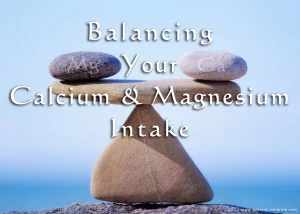For those not familiar with the complementary relationship between calcium and magnesium, the first and foremost fact that should be known is that they go hand in hand. If you have been following advice on taking calcium, but our dear, sweet magnesium has not come up in conversation… something is amiss.
A Balancing Act
It’s far past time that we cover the subject of electrolyte balance – specifically, the balance between calcium and magnesium. Among the top ten questions that we get asked frequently is, “How much magnesium should I be taking in relation to calcium?”

But before we get to “how much,” let’s first touch on the “why.” Why do you need to take magnesium to balance your calcium, and why is the ratio so very critical?
Most importantly, calcium cannot be routed and utilized to its utmost without sufficient magnesium. These minerals play equally important roles, but simply opposite each other. Calcium is required for the contracting of muscles, whereas magnesium is needed to relax them. Calcium strengthens & hardens bones, but magnesium provides the elasticity and flex needed to keep them from shattering. Calcium stimulates nerves while magnesium soothes them.
Unfortunately, being opposite of each other, but working in tandem, is much like a see-saw… if one side holds a 200lb adult, and the other a 35lb toddler, no fun will be had by anyone. Of course, that’s being a bit blasé about the very serious repercussions of having too much calcium and not enough magnesium.
Too Much Calcium
Ideally, from a health standpoint, calcium belongs outside of your cells, while magnesium stays inside acting as a sort of sentry and kicking out the calcium that happens to slip in.
So what happens when your magnesium is low and you don’t have the means to keep calcium at bay? Damage… lots and lots of damage.
Without magnesium there to prevent this rather opportunistic mineral from going where it shouldn’t, calcium can infiltrate soft tissues resulting in debilitating and life threatening conditions such as atherosclerosis (hardening of the arteries) & arthritis. In fact, too much undirected, free-to-roam calcium has been implicated in a whole host of health issues including kidney stones, lung nodules & respiratory issues, bones spurs, and heart complications. Of course, a magnesium deficiency, in and of itself, brings with it its own health complications.
For many years after the marketing explosion of “milk is good for your bones” and the corresponding increase in dairy consumption, the statistics for associated diseases rose as well. The continued push for calcium to strengthen bones in growing children & prevent osteoporosis in mature adults is now beginning to show cracks in its foundation.
Although numerous past studies have indicated a need for balance in minerals, only recently has research begun to filter through to the mainstream that emphasizing increased intake of calcium only is, in fact, detrimental to overall health and well-being. And, while this unfortunate piece of “advice” will most likely echo for years to come, thankfully modern medicine is beginning to grasp the necessity for balance… and therefore, see the need to rectify deficiencies in calcium’s counterpart, magnesium.
The most difficult aspect of this is determining what balance will truly be most efficacious.
Optimal Intake
With almost 50 years elapsed since Dr. Seelig’s research on magnesium retention in relation to calcium intake, we’ve had ample time to build upon it and further our understanding. The short and sweet answer would be roughly around 2 to 1, with calcium being twice that of magnesium. However, it should be noted that this ratio of calcium is a maximum, rather than a minimum.


One must remember, of course, that when referring to “intake,” this not only includes supplements, but food, beverage, and water sources as well. If you are one of many who enjoys drinking milk, eating yogurt & ice cream, or partaking in cheesy meals, you may find yourself struggling to maintain mineral equilibrium. Not only that, but calcium is common amongst modern diets – especially given our penchant for “fortifying” foods – while dietary magnesium content (outside of supplementation) has dropped significantly over the years.
Also, an important things to note is that excessive calcium intake in a magnesium deficient state may exacerbate that condition and all resulting health issues. If you are beginning your “mineral balance” journey from a point of extremely low magnesium levels, the 2 to 1 ratio will not necessarily apply.
That being said, dietary needs and supplementation are not one-size-fits all, so it is always recommended to speak with your physician(s) as well as do your own research to help determine what will best suit your needs.
